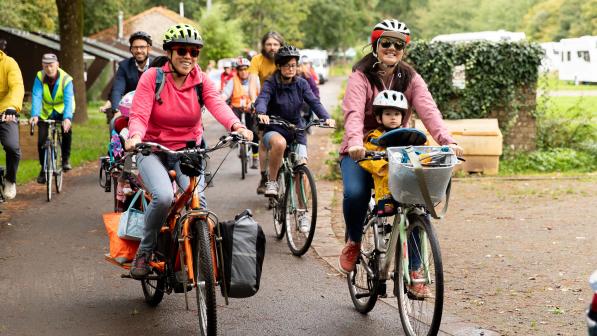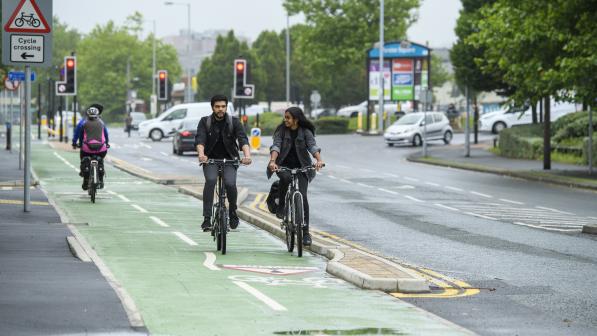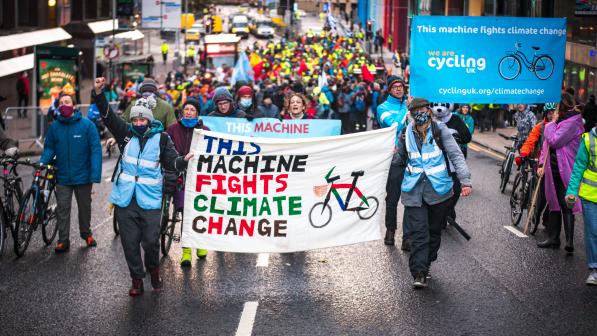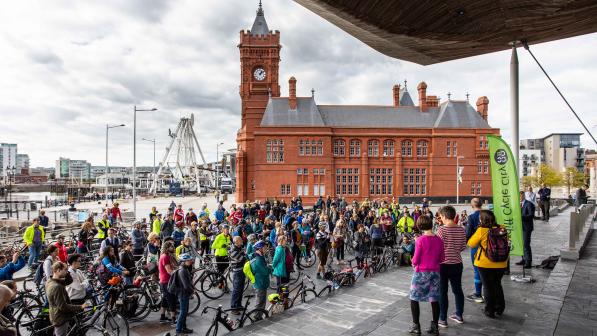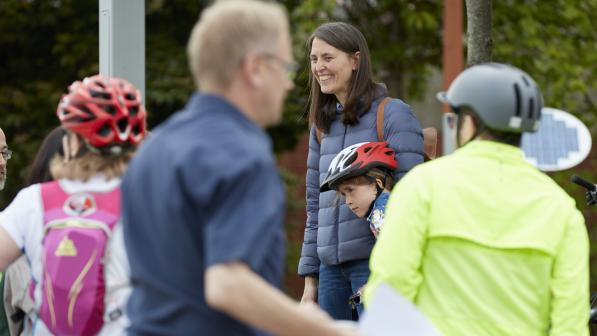Cycle campaigning creates unlikely alliances

Collaboration can allow people with different interests to come together for a common goal. Sometimes, history delivers somewhat surprising alliances. Think LGBTQ rights and Welsh miners during the 1980s, as covered by the 2014 film, Pride.
Coalitions can be tricky work, with personality clashes or contrasting opinions leading to conflict. This is especially true when the groups involved aren’t traditionally aligned – or might even be seen as in conflict themselves. However, overcoming such differences can result in the most notable campaign wins. This blog takes examples from this – and calls out to campaign groups who may share our aims to connect with us and energise our movement.
Motorists1
It might not seem like it today, with cyclists and motorists characterised as natural enemies, but in the past the two groups often worked together successfully. Both groups were an instrumental force in the Victorian movement for better roads – with policies created that continue to benefit both user groups to this day.
Innovators in motoring and cycling were often cut from the same cloth. J. K. Starley & Co, who designed Coventry’s iconic Rover ‘Safety’ bicycle, would go on to manufacture motor cars, the company today is known as Jaguar Land Rover.
This extended to writers and interest groups. The magazine, Autocar – was founded by an editor of a cycle magazine. Closer to home, Sir David Lionel Salomons, a trustee of the then Cyclists’ Touring Club (CTC), created the Self-Propelled Traffic Association, Britain’s first motoring organisation, in 1895.
These pioneers, based across both sides of the Atlantic, strived for Government funding and united pursuing legislation for roads improvement. Their lobbying helped to yield the Locomotive Acts of 1878 and then 1896, which legalised use of cycles and motor cars on British roads respectively. And in 1909, the Road Board was commissioned, authorised to construct, and maintain new roads. Carlton Reid’s book on this matter, Roads were not built for cars, is introduced by no less than Edmund King OBE - President of the AA; who has called for greater provision of segregated cycling infrastructure, and reminded motorists to give a wide berth when passing cyclists.
In the 21st century, relationships between cyclists and motorists can be presented as fractured, the two groups painted as divided tribes.
This binary is simply untrue. Cycling UK’s statistics show that most cyclists also drive, with investment in cycling infrastructure highly beneficial to motorists – giving the opportunity for more people to cycle safely, reducing congestion for those who need to use the car, making their journeys quicker and easier.

Horse riders
As we ride bikes, whether it be on-road or off, we are likely to encounter horse riders. At times, riders come into conflict with equestrians, as horses can be easily spooked by cyclists passing too fast and close. However, both groups share a higher degree of vulnerability when compared to those travelling in motor vehicles, and hence horse riders have been a core ally in some of our most prominent campaigns.
In 2018, Cycling UK joined forces with The British Horse Society (BHS) to launch a campaign of consideration and courtesy, to reduce the risk of injury to cyclists, horses, and their riders. The message of ‘Be Nice, Say Hi’ was introduced to help cyclists and horse riders to pass safely. Cycling UK created a downloadable leaflet and two short videos, informing cyclists how to safely pass horse riders both on and off the road.
As vulnerable road users, Cycling UK and the BHS have spoken out for improved road safety measures on behalf of both groups. Words and platitudes have extended to the sharing of ideas and initiatives. When Cycling UK released its ‘Too Close for Comfort’ campaign in 2019, BHS had recently pioneered the use of a Virtual Reality (VR) video for road safety awareness. This idea was so good, that Cycling UK saw VR was an unpassable opportunity, and used it to speak out for cyclists road safety issues. Cycling UK worked with partner, FirstCar, to produce its first VR film and shared it with Police Services across the UK, these resources becoming a backbone to many Close Pass Operations, educating motorists, and making the roads safer for those cycling.
The success of this campaign was an important achievement in the journey to help change the Highway Code in 2022. Now, clear guidance is outlined relating to minimum overtaking distances for cyclists, and a new Hierarchy of responsibility exists to protect more vulnerable road-users, improving conditions for both cyclists and horse riders.

Artists
A single image is arguably more powerful than a thousand words – pieces of art tugging emotive strings can be solidified into memory. Artists have played a key role in helping highlight the principles behind Active Travel and Better Streets to new audiences, this culture growing and diversifying our movement.
Did you know that John Lennon and Yoko Ono's infamous 'bed-in' at Hilton's Amsterdam Hotel provided a launchpad for the world's first bike-sharing initiative? Alongside the musicians call for peace in the backdrop of the War in Vietnam, a campaigner at Provo pictured John & Yoko alongside a ‘white-fiets’, to suggest an alternative to the dominance of cars. This provided savvy marketing for Provo’s ground-breaking White Bike Plan. Decades later, bike-sharing schemes across the world surely have a debt to John and Yoko!
Creative arts and digital media continue to advocate for cycling in the modern world. Murals, such as works in Manchester and Rotterdam, have immortalised key figures in the city's cycling revolution, or been designed as an interactive art piece in to promote cycling’s virtues. And in the online universe, graphics have been projected on iconic landmarks to support pressing campaigns. Novel cartoons depicting absurdities of current policy, such as fantastic works from frequent Cycling UK collaborator, Dave Walker spread far and wide via social media, quickly feeding vast hungry networks of cycling activists – fuelling a determination to demand more of our decision-makers.

Make Cycling UK your ally
Cycling UK wants to support and grow the movement of people speaking up for active travel, and is here to support local campaigners, whether you’ve been calling for change for days, months or years. Unlikely alliances work, so whether you’re calling for change in walking, cycling, road safety, safer streets, the climate, or beyond – we want to hear from you.
The charity aims to do this through the Cycle Advocacy Network (CAN) – a hive of over 300 local campaigners across the UK, who frequently come together to share ideas and motivate one another at our online events and the CAN Forum.
This year, as CAN continues to evolve, local cycling campaign groups can now ‘Partner with CAN’, in England, Scotland, Wales or Northern Ireland.
Why partner with CAN?
Cycling UK want to involve you in the national conversation and amplify your work. Your group deserves to be championed across the campaign community and receive support for your ongoing projects. We hope to do this by providing bespoke advice and guidance, offering the use of Cycling UK and CAN logos on letters and formal submissions, and celebrating your group with a place on the Cycling UK CAN Map.
These alliances will grow our movement. A movement dedicated to better streets, a cleaner environment, and a healthier population. Let’s strive together for campaign wins across the nations and truly give millions more people the opportunity to cycle.
Find out more about the Cycle Advocacy Network and join us on the journey to get more people cycling.
Reference: i) Roads were not built for cars: How Cyclists were the first to push for good roads & became the pioneers of motoring. C Reid (2014)

